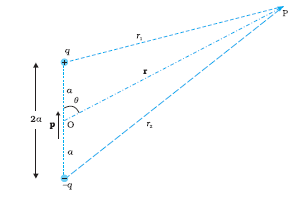Derive an expression for the electric …

CBSE, JEE, NEET, CUET
Question Bank, Mock Tests, Exam Papers
NCERT Solutions, Sample Papers, Notes, Videos
Posted by Tanu Sahu 5 years, 2 months ago
- 2 answers
Gaurav Seth 5 years, 2 months ago
Consider, two charges q and -q seperated by distance 2a such that, it's total charge is 0.

Potential due to charge q =
Potential due to charge -q =
Potential due to dipole, is the sum of potential due to charges q and -q.
Therefore,
where, r1 and r2 are distances of charges q and -q from point P.
Now,
Considering r much greater than a, r>>a.
Therefore,
Putting these values in the above equation of potential we have,
where,
For potential at any point on axis,
V=
Potential is positive when and potential is negative when
.
Electrical potential falls off at large distance, as and not as
characteristic of the potential due to a single charge.
Related Questions
Posted by Anterpreet Kaur 1 year, 7 months ago
- 0 answers
Posted by Aniket Mahajan 1 year ago
- 0 answers
Posted by Khushbu Otti 1 year, 7 months ago
- 0 answers

myCBSEguide
Trusted by 1 Crore+ Students

Test Generator
Create papers online. It's FREE.

CUET Mock Tests
75,000+ questions to practice only on myCBSEguide app
 myCBSEguide
myCBSEguide

Gaurav Seth 5 years, 2 months ago
Let P be an axial point at distance r from the center of the dipole. Electric potential at point P is given as
V=V1+V 2
V1 and V 2
are the potentials at point P due to charges +q and –q respectively
V=1/ 4πε0( q/r−2a+(-q/ r+2a ))
V= 1/4πε0 ( 4a/(r²-4a²))
V= 1/4πε0(2P/(r²-4a²))
Hence, the electric potential is 1/4πε0 (2P/r²-4a²))
0Thank You